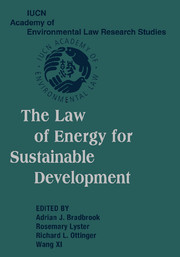Book contents
- Frontmatter
- Contents
- Acknowledgments
- Message from Kofi A. Annan, Secretary-General, United Nations
- Introduction – A Global Learned Society to Address Earth's Evolution: The IUCN Academy of Environmental Law
- Public Lectures on International Environmental Law
- PART ONE SUSTAINABLE DEVELOPMENT AND THE ROLE OF ENERGY LAW
- PART TWO LEGAL ISSUES IN CONTEMPORARY ENERGY LAW
- PART THREE INTERNATIONAL ENERGY LAW
- PART FOUR COMPARATIVE ENERGY LAW
- PART FIVE ELECTRICITY RESTRUCTURING
- PART SIX FINANCING FOR SUSTAINABLE ENERGY
- PART SEVEN CIVIL SOCIETY AND THE PROCEDURAL REQUIREMENTS OF ENERGY LAW FOR SUSTAINABLE DEVELOPMENT
- 30 The Role of Civil Society
- 31 Foundations in University Education
- 32 The Role of the Judiciary
- 33 Access to Justice and Citizen Enforcement
- 34 The Business Case and Approach to Sustainable Energy
- Index
31 - Foundations in University Education
Published online by Cambridge University Press: 10 August 2009
- Frontmatter
- Contents
- Acknowledgments
- Message from Kofi A. Annan, Secretary-General, United Nations
- Introduction – A Global Learned Society to Address Earth's Evolution: The IUCN Academy of Environmental Law
- Public Lectures on International Environmental Law
- PART ONE SUSTAINABLE DEVELOPMENT AND THE ROLE OF ENERGY LAW
- PART TWO LEGAL ISSUES IN CONTEMPORARY ENERGY LAW
- PART THREE INTERNATIONAL ENERGY LAW
- PART FOUR COMPARATIVE ENERGY LAW
- PART FIVE ELECTRICITY RESTRUCTURING
- PART SIX FINANCING FOR SUSTAINABLE ENERGY
- PART SEVEN CIVIL SOCIETY AND THE PROCEDURAL REQUIREMENTS OF ENERGY LAW FOR SUSTAINABLE DEVELOPMENT
- 30 The Role of Civil Society
- 31 Foundations in University Education
- 32 The Role of the Judiciary
- 33 Access to Justice and Citizen Enforcement
- 34 The Business Case and Approach to Sustainable Energy
- Index
Summary
INTRODUCTION
Energy is not so much a single product as a mix of products and services, a mix upon which the welfare of individuals, the sustainable development of nations, and the life-supporting capabilities of the global ecosystem depend. In the past, this mix has been allowed to flow together haphazardly, the proportions dictated by short-term pressures on and short-term goals of governments, institutions and companies. Energy is too important for its development to continue in such a random manner. A safe, environmentally sound, and economically viable energy pathway that will sustain human progress into the distant future is clearly imperative. It is also possible. But it will require new dimensions of political will and institutional co-operation to achieve it.
(Brundtland Report)In first articulating the principle of sustainable development – that form of economic transformation that ensures development meets the needs of the present without compromising the ability of future generations to meet their own needs – the 1987 Report of the World Commission on Environment and Development (the Brundtland Report), provided a powerful argument for a comprehensive, integrated, and participatory approach to the interlocking crises of environment and development, an approach that calls for profound policy, institutional, legal, and personal change. The concept of sustainable development was strongly endorsed by the United Nations and its member states at the 1992 Conference on Environment and Development (UNCED), resulting in Agenda 21, a comprehensive and detailed blueprint for implementation at both global and local levels, and has since been adopted, both internationally and domestically, in various environmental contexts.
- Type
- Chapter
- Information
- The Law of Energy for Sustainable Development , pp. 540 - 559Publisher: Cambridge University PressPrint publication year: 2005



